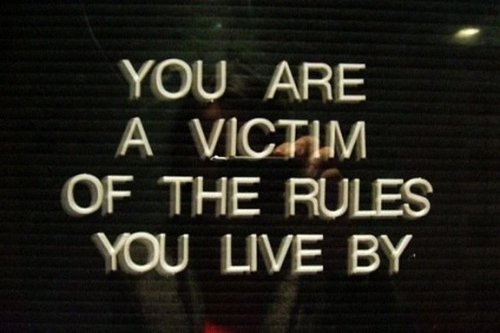(via)
My vocation [as a writer] changed everything: the sword-strokes fly off, the writing remains; I discovered in belles-lettres that the Giver can be transformed into his own Gift, that is, into a pure object. Chance has made me a man, generosity would make me a book.
- Jean Paul Sartre
A gift that has the power to change us awakens a part of the soul. But we cannot receive the gift until we can meet it as an equal. We therefore must submit ourselves to the labor of becoming like the gift.
[…]
For the slow labor of realizing a potential gift the artist must retreat to those Bohemias, halfway between the slums and the library, where life is not counted by the clock and where the talented may be sure they will be ignored until that time, if it ever comes, when their gifts are viable enough to be set free and survive in the world.
- Lewis Hyde, The Gift
“I want to find out why I’m working,” Cary Grant tells Katharine Hepburn in “Holiday.” Grant’s character, a grocer’s son who put himself through Harvard, wants to take time off from a promising business career, and Grant makes the proposal sound at once existential and lighthearted—as if he wants to investigate not because he’s especially troubled or especially gifted but because this is the sort of thing human beings like to know, and he happens to have the means to try to find out. “The answer can’t be just to pay bills and to pile up more money,” he says.
- Caleb Crain, “It Happened one Decade” The New Yorker
But will people pay for art untethered to tangible things, when it can be replicated and transmitted with the push of a button? How are creative types supposed to sustain themselves and their efforts? After all, despite the plummeting cost of online distribution, art still requires an artist, a flesh-and-blood person who does the work and must be paid.
[…]
It is a cruel parody of the traditional distinction between art and commerce. As the critic Lewis Hyde observes, “When the song of one’s self is coming all of a piece, page after page, an attic room and a chamber pot do not insult the soul.” But the same message reduced to an economic truism—decline in industry profitability won’t hurt artistic production because artists will work for beer—rings not just hollow, but obscene.
- Astra Taylor, “Surfing the Net,” The Baffler
“The Adderall Diaries” is my seventh book. I have my following, but I’m not famous. I didn’t want to travel thousands of miles to read to 10 people, sell four books, then spend the night in a cheap hotel room before flying home.
[…]
I decided to try something I hoped would be less lonely.[…]
When you read in people’s homes you’re reading to a reflection of their world.[…]
The readings mostly went very long, over an hour with questions, and people didn’t leave… In a weird way the readings began to feel like an extension of the book.
- Stephen Elliott, “The D.I.Y. Book Tour,” The New York Times
This country is proud of its dead poets. It takes terrific satisfaction in the poet’s testimony that the USA is too tough, too big, too much, too rugged, that American reality is overpowering. And to be a poet is a school thing, a skirt thing, a church thing. The weakness of the spiritual powers is provided in the childishness, madness, drunkenness, and despair of these martyrs. Orpheus moved stones and trees. But a poet can’t perform a hysterectomy or send a vehicle out of the solar system. Miracle and power no longer belong to him. So poets are loved, but loved because they just can’t make it here. They exist to light up the enormity of the awful tangle and justify the cynicism of those who say, “if I were not such a corrupt, unfeeling bastard, creep, thief, and vulture, I couldn’t get through this either. Look at those good and tender and soft men, the best of us. They succumbed, poor loonies.”
- Saul Bellow, Humboldt’s Gift
___
“Now,” says Mr. Gradgrind, “what I want is Facts. Teach these boys and girls nothing but Facts. Facts alone are wanted in life. Plant nothing else, and root out everything else. You can only form the minds of reasoning animals upon Facts: nothing else will ever be of any service to them. This is the principle on which I bring up my own children, and this is the principle upon which I bring up these children. Stick to facts, Sir!”
- Charles Dickens, Hard Times
